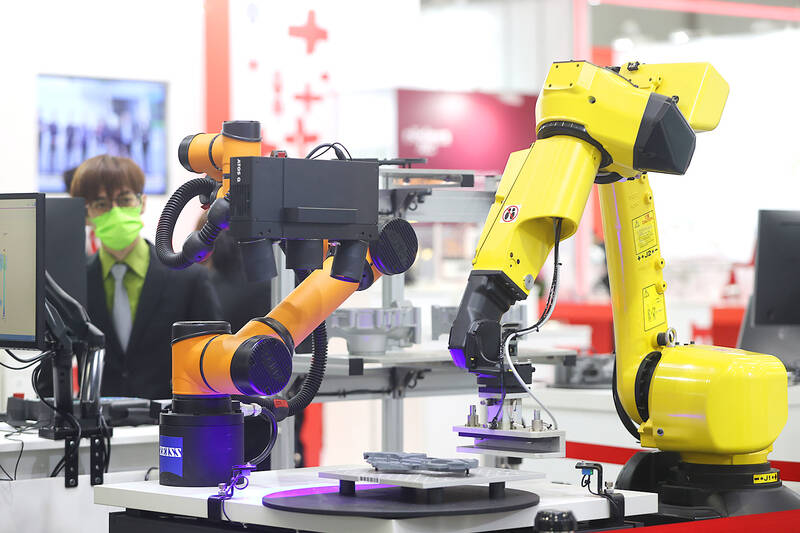The Taipei International Machine Tool Show (TIMTOS) opened yesterday, with more than 1,000 local and international exhibitors showcasing their products.
It is to run through Saturday at the Taipei Nangang Exhibition Center’s halls 1 and 2, as well as the Taipei World Trade Center’s Exhibition Hall 1.
Exhibitors from 18 countries and territories are showcasing their products to more than 4,000 potential buyers expected to attend the trade show, the organizers said.

Photo: CNA
An online version of the exhibition would run until April 6, they said.
The products being displayed include metal-cutting machine tools, machine tool parts, laser punching machines, metal forming machinery, casting and forging equipment, tube and wire processing tools, and surface treatment equipment.
More sophisticated control systems and industrial robots, as well as inspection and measurement instruments and software, are also being displayed.
Denmark, Germany, Switzerland and the US opened national pavilions at the show.
The show is organized by the government-sponsored Taiwan External Trade Development Council (TAITRA, 外貿協會) and the Taiwan Association of Machinery Industry (TAMI, 台灣機械公會).
The event is expected to attract 50,000 visitors from home and abroad, making it an important indicator for economic recovery this year, TAITRA said.
At the exhibition’s opening ceremony yesterday, TAMI chairman Larry Wei (魏燦文) said the trade show is expected to create more than US$2 billion in business opportunities.
After facing the challenges of the COVID-19 pandemic and global economic uncertainty over the past three years, the machinery sector has regained its footing to unveil advanced products that reduce carbon emissions, as well as optimized services, he said.
Taiwan is the world’s fifth-largest machine tool exporter, Wei said, after the nation’s overseas sales last year rose 8.6 percent annually to US$3.02 billion.
President Tsai Ing-wen (蔡英文) said at the opening ceremony that the local machinery industry is the third sector in Taiwan to generate more than NT$1 trillion (US$32.71 billion) in output value, after the semiconductor and optoelectronics sectors, reflecting its competitiveness.
The local machinery industry has created more than 350,000 jobs since 2017 as it transformed itself from a precision industry into a smart industry, she said.
TAITRA chairman James Huang (黃志芳) said it is particularly remarkable that Turkey sent a delegation of 20 potential buyers to the trade show, despite the country’s southeast being struck by a magnitude 7.8 earthquake last month.
Turkey was the third-largest buyer of Taiwan’s machining centers last year, Huang said.
There is strong potential for the two sides to continue cooperating on machinery in the post COVID-19 era, he added.
Also attending the opening ceremony, American Institute in Taiwan Director Sandra Oudkirk praised the performance of Taiwan’s machinery industry, saying Taiwan has played a critical role in global supply chains.

Taiwan Semiconductor Manufacturing Co (TSMC, 台積電) last week recorded an increase in the number of shareholders to the highest in almost eight months, despite its share price falling 3.38 percent from the previous week, Taiwan Stock Exchange data released on Saturday showed. As of Friday, TSMC had 1.88 million shareholders, the most since the week of April 25 and an increase of 31,870 from the previous week, the data showed. The number of shareholders jumped despite a drop of NT$50 (US$1.59), or 3.38 percent, in TSMC’s share price from a week earlier to NT$1,430, as investors took profits from their earlier gains

In a high-security Shenzhen laboratory, Chinese scientists have built what Washington has spent years trying to prevent: a prototype of a machine capable of producing the cutting-edge semiconductor chips that power artificial intelligence (AI), smartphones and weapons central to Western military dominance, Reuters has learned. Completed early this year and undergoing testing, the prototype fills nearly an entire factory floor. It was built by a team of former engineers from Dutch semiconductor giant ASML who reverse-engineered the company’s extreme ultraviolet lithography (EUV) machines, according to two people with knowledge of the project. EUV machines sit at the heart of a technological Cold

TAIWAN VALUE CHAIN: Foxtron is to fully own Luxgen following the transaction and it plans to launch a new electric model, the Foxtron Bria, in Taiwan next year Yulon Motor Co (裕隆汽車) yesterday said that its board of directors approved the disposal of its electric vehicle (EV) unit, Luxgen Motor Co (納智捷汽車), to Foxtron Vehicle Technologies Co (鴻華先進) for NT$787.6 million (US$24.98 million). Foxtron, a half-half joint venture between Yulon affiliate Hua-Chuang Automobile Information Technical Center Co (華創車電) and Hon Hai Precision Industry Co (鴻海精密), expects to wrap up the deal in the first quarter of next year. Foxtron would fully own Luxgen following the transaction, including five car distributing companies, outlets and all employees. The deal is subject to the approval of the Fair Trade Commission, Foxtron said. “Foxtron will be

INFLATION CONSIDERATION: The BOJ governor said that it would ‘keep making appropriate decisions’ and would adjust depending on the economy and prices The Bank of Japan (BOJ) yesterday raised its benchmark interest rate to the highest in 30 years and said more increases are in the pipeline if conditions allow, in a sign of growing conviction that it can attain the stable inflation target it has pursued for more than a decade. Bank of Japan Governor Kazuo Ueda’s policy board increased the rate by 0.2 percentage points to 0.75 percent, in a unanimous decision, the bank said in a statement. The central bank cited the rising likelihood of its economic outlook being realized. The rate change was expected by all 50 economists surveyed by Bloomberg. The